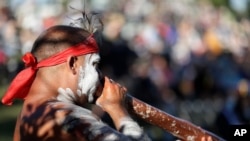The first national study of its kind has found “consistent links” between racism and poor mental and physical health of Aboriginal Australians. The study has found that discrimination is associated with elevated rates of depression, heart disease, high blood pressure and diabetes.
This is the first time Australian researchers have found a connection between discrimination and health. Racism has been linked to higher rates of depression, heart disease and diabetes in Indigenous communities.
Almost 60% of respondents to the Australian National University study said they have faced prejudice in their everyday lives. It corrodes self-belief and their “cultural wellbeing,” the study said.
Alcohol dependence is another visible symptom of racism, according to the academics.
They analyzed data from more than 8,000 Indigenous Australians between 2018 and 2020.
One of the authors, associate professor Raymond Lovett, said the impact of discrimination on health is profound.
“If people experienced even a small amount of discrimination and racism, then we saw a very high reporting of those poorer outcomes,” he said. “And then, when we looked at the really severe end about experiencing a lot of this kind of discrimination, those outcomes were multiplied even further, which tells us that, you know, the more you experience the more of an impact it has.”
Life expectancy for Aboriginal Australians is about eight years less than non-Indigenous people. Rates of unemployment and imprisonment are also disproportionately high.
Campaigners also claim racism is one reason why large numbers of Aboriginal children are removed from their families by child protection officials. Reports have said they are almost 10 times more likely to be taken into state care than nonAboriginal children.
Indigenous activist Ray Minniecon said parents are invariably bereft when judges order their children be taken away.
“The hardest and most harrowing thing that you can feel is, you know, when our mothers and fathers come out of that particular court and then their kids are gone and they cannot get them back, and they have got no power,” he said. “They are just powerless, and they are just sitting in the streets there on the gutter and we just can sit there and cry with them and that is all we can do.”
The Australian government has said there have been “heartening improvements” in “key areas” of First Nation health and education, but it has acknowledged that much more needs to be done.
Australia’s original inhabitants make up about 3% of Australia’s population and have a history dating back an estimated 65,000 years.









